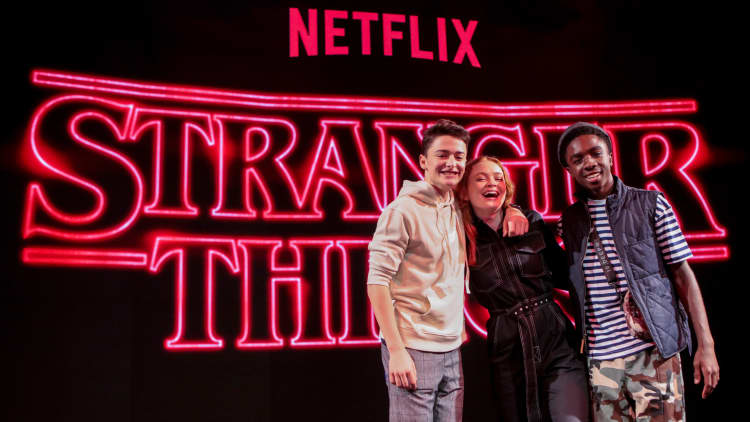When it comes to high-growth technology stocks, Wall Street often advises investors to look beyond the short-term numbers — especially when they are bad. In the case of Netflix, the numbers look fine right now, but there is still a fundamental question about the streaming video service's long-term future that should give investors pause.
The greatest innovation that Netflix is capable of producing is already in its past, according to some tech experts.
"Think about how disruptive they can be. ... Think about Amazon, Apple, Google [Alphabet]. ... They will change the world dramatically, so it will be easier to build high-multiple models for them," said Gene Munster, managing partner of tech investment firm Loup Ventures. "In the case of Netflix, they won't change the world again ... and I struggle with that question," Munster said.
The tech investor said the success Netflix has had in capturing a significant portion of the legacy broadcast television audience through its online streaming service does not equate to an outsized multiple over the next decade.
The recent earnings and performance of Netflix shares indicate that if the tech investor turns out to be right, a lot of Netflix shareholders may be left holding the bag. Netflix has outperformed the FAANGs (Facebook, Apple, Amazon and Google's parent, Alphabet) so far in 2019. It was trading at a price-to-earnings ratio near 130, as of Jan. 24. Apple was trading at a P/E of roughly 13; Facebook at 21; Alphabet at 40. Amazon is the closest to Netflix, with a P/E just over 100.
In the short-term, Netflix is delivering.
Its subscriber growth of 17 percent in the just-reported quarter is consistent with a high-growth story, Munster said. "Anything better than 12 percent is high growth," he said.
The streaming video company has 139 million paying subscribers at the end of 2018 and added 29 million subscribers last year versus 22 million in 2017, with the most impressive growth coming from its international markets, and that will continue to be a big 2019 story, Munster said.
The company's guidance for subscriber growth in the March-end quarter is similar. "The number of original content shows outside the U.S., growth of subs outside of the U.S. and pricing increases outside of the U.S. will dominate the Netflix conversation — and it is a big opportunity."
Still, Munster is cautious — if not bearish — in his outlook for Netflix. There are multiple reasons cited to be hesitant buying Netflix at its current share price. It reported a slight revenue miss in the most recent quarter. The price increase Netflix announced ahead of earnings — the biggest in its history — could lead to subscriber losses and hit the bottom line.
Finally, as it continues to spend heavily on original content, Netflix will need to take on more debt, which has already increased from $6.5 billion at the end of 2017 to $10.36 billion at end of 2018. "The company eventually has to show operating margin leverage in 2020 or 2021 to begin to pay down debt," Munster said.
Those concerns may limit the stock's near-term upside. "It should be an average year for Netflix. ... The bar gets higher every time it does something great. I see only modest upside," Munster said. "They need to be blowing numbers ... and we're just not seeing that."
New Netflix CFO Spencer Neumann said on the recent earnings call that spending on content has put pressure on the cash flows of the business over the past few years. The company had negative cash flow of roughly $3 billion in 2018 and is predicting "sort of similar levels in 2019." It will continue to use the debt markets to finance the business, Neumann said, but he added that Netflix is committed to 13 percent operating margins in 2019 and beyond.
While Munster does not think its current outperformance versus the FAANG group of stocks can be maintained over the full year, his biggest concerns will play out over multiple years. Fast forward two to three years and Munster thinks the other streaming players may catch up up to Netflix in spending on original content. And the traditional media companies are finally ramping up streaming plans as well.
Comcast's NBCUniversal just announced its plan for a streaming service. Disney is launching its streaming service later this year. Viacom announced the acquisition of a streaming company on Wednesday.
The closing of the gap in streaming will come as the other big technology companies continue to expand into new, innovative businesses.
"Netflix is not going to make a dramatic change to our lives in the next decade," Munster said.
Disclosure: Comcast is the parent company of NBCUniversal and CNBC.



